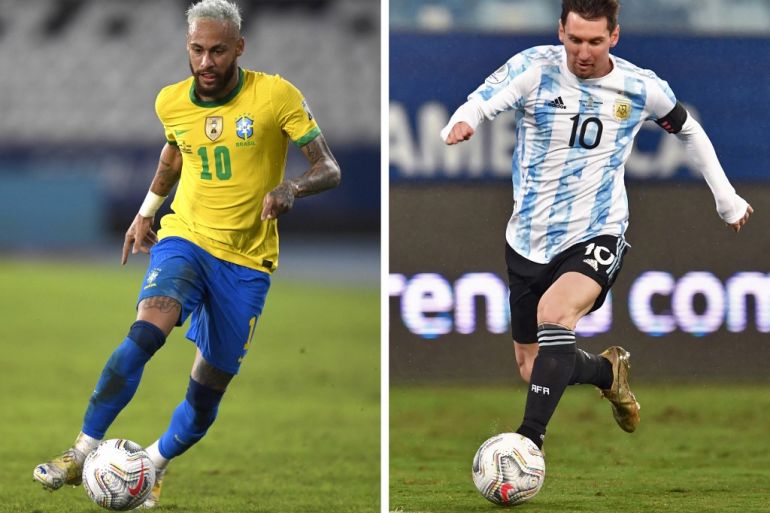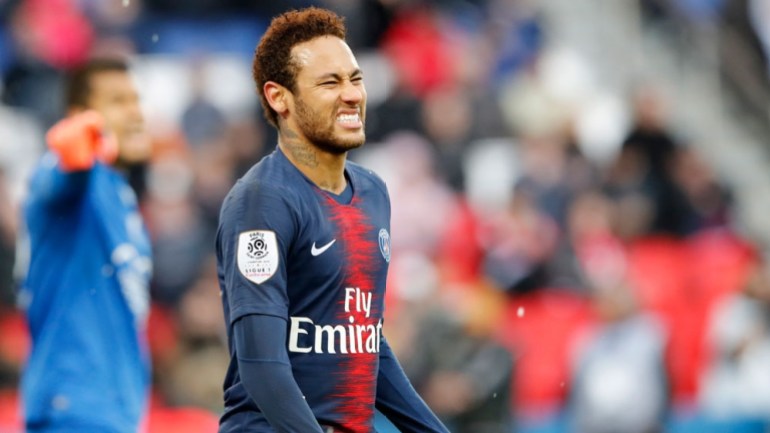Analysis: Messi, Neymar and the Copa America final
The two superstars set to lead Argentina and Brazil in Copa America final played at Maracana Stadium in Rio de Janeiro.

When Lionel Messi plays for his national team, Argentina, it often looks like he is carrying a burden. There seems to be little joy to his gestures. Argentinians, in the past, have also accused of playing without any emotion and that they could not identify with him.
For all the success he has had with his club, FC Barcelona, that made Messi the best player of his generation, the same cannot be said for the national team. Though the 34-year-old had team success with the national team at youth level, the last major trophy won by the men’s national team was the Copa America in 1993.
Keep reading
list of 4 itemsSaudi reviews football fan rules after whip attack
Bayer Leverkusen win first Bundesliga title, ending Bayern Munich’s reign
Arsenal shocked by late Aston Villa double as title tilts towards Man City
Before that, Argentina had won the Copa America in 1991 and the World Cup in 1986. In the latter, the team was carried by the genius of Diego Maradona, the player whose shadow Messi has chased ever since. The 1991 and 1993 Copa America titles were won by a tight knit group of journeymen and hard workers such as Diego Simeone, who has since built a similar reputation as manager at Spanish champions Atletico Madrid.
On Saturday evening, at Maracana Stadium in Rio de Janeiro, Messi leads Argentina in the final of the Copa America against Brazil. Many think it is his last chance to win a major trophy. He came close in 2014 when Argentina lost to Germany in the World Cup final (in the same stadium where tonight’s match will be played) and in 2016 when the Copa America celebrated its centenary with a final in New Jersey in the United States.
That night, Argentina lost to Chile in a penalty shoot-out. Messi took the first penalty and skied it into the crowd. It was the third final he had lost with Argentina in 10 years. After the game, he announced his retirement. However, he came back to play for the national team in the 2018 World Cup in Russia, where the team and Messi were eliminated 4-3 by eventual champions France in the round of 16.
In the aftermath of that 2018 World Cup exit, Jesica Paola Kessler, an Argentinian sports administrator, argued Argentinians judge the national team the same way they judge the country’s political management. “In each case, the scrutiny comes every four years and the one to take the blame is the charismatic leader,” she wrote.
While football and governance is usually teamwork, they blame or praise one player for the outcome.
“The same happens with governance. Whenever the charismatic leader appears, he or she acts as a messianic agent, who is seen as the only natural leader, with the right to rule and the only one qualified to govern and save the team or the country. When they fail, the people shout for their head,” Kessler said.
Maradona carried that burden in the 1980s and it took its personal toll by the end of that decade and subsequent one, while Messi has carried that burden since the late 2000s. It comes with the territory.

Fans watching the Copa America on TV – the games are being played in empty stadiums in Brazil; the tournament was moved there because of surging COVID-19 infections in Argentina and anti-government protests in Colombia – and journalists covering it have noticed, however, that Messi may be finally reconciling with Argentinian expectations. And it was most evident during Wednesday night’s semifinal against Colombia that had to be decided by penalties after a 1-1 regular time score.
Argentina’s goalkeeper Emiliano Martinez was their hero, saving three of the shoutout penalties. But it was Messi, who converted his own spot kick, who received the most attention afterwards for his actions. As Martinez saved the penalty of Colombia’s Yerri Mina, a former Barcelona player known for his over-the-top celebrations, Messi balled his fists from the centre circle, and yelled at Mina, “How about dancing now?” This, combined with how Messi is carrying Argentina, has stood out. Of Argentina’s 11 team goals, Messi has scored four and assisted five others.
‘Hope just on Neymar’
Not surprisingly, the final is billed as “Messi versus Neymar”, his former Barcelona team-mate. Like Argentina, Brazil’s global reputation is derived mostly from its success as a footballing nation. Its team, on paper, is stronger than Argentina and they are favourites. With Neymar upfront, they breezed through the group and knockout stages. But many Brazilians cannot relate to the team. The majority of the squad play in Europe.
Danê Jaheem Sosaba, a writer and researcher in Sao Paolo, says this generation of Brazilian national team players lack the abundance of superstars as the 2002 world champions, for instance, that had the likes of likeable players such as Ronaldo, Ronaldinho and Rivaldo. “Most Brazilians would not be able to name many other first-team players besides Neymar, so they put a lot of hope just on him.”
But the alienation from the team is also related to the country’s current political and health crisis. Brazil has a very unpopular right-wing government led by President Jair Bolsonaro, who admires the country’s military dictatorship which ruled violently in the 1960s. Bolsonaro has also downplayed the severity of the COVID-19 pandemic. His country has had a total of 19 million cases and more than half a million deaths thus far. In contrast, Argentina, whose centre-left government has been credited with managing the pandemic better, only has 4.6 million cases and 98,000 deaths.
According to Sosaba, many Brazilian fans and commentators could not help notice “the contrast between Bolsonaro’s quick reply to [continental football association] CONMEBOL’s proposal [to host the tournament] and his administration’s delayed reply to vaccine manufacturers”.
It does not help that many of Brazil’s national football team members, including Neymar, are supporters of Bolsonaro. Some of the players are devout charismatic or evangelical Christians, a group that forms the backbone of Bolsonaro’s base. An exception is the coach, Tite.

In the last week, one of the big talking points before the final was that a significant section of Brazilian fans will be supporting Argentina. Some of them say they are doing it for Messi; he deserves “justice” to win a competition wearing his national team shirt. At press conferences, Brazil’s captain, Thiago Silva, and another senior team player, Marquinhos, expressed surprise at Brazilian fans’ negative attitude towards the team. Neymar also weighed in. He lambasted Brazilian fans on Instagram, accusing them of being unpatriotic. “I never attacked nor would I ever
attack Brazil if they are playing for something, whatever the sport, a model [beauty] contest, the Oscar … I am Brazil, and who is Brazilian and does it differently?” He ended that while he respected their choice, they should “go to hell”.
This may not have helped Neymar’s reputation among Brazilian fans. “As a football player, he is considered a failure when it comes to decisive moments, important games: he is often injured and does not play on those occasions,” says a political commentator, who is very critical of the government and who wanted to remain nameless. “His image is currently bad here in Brazil. I think many Brazilians trust Messi’s discreet and consistent style more,” in contrast to Neymar’s “rich kid” and “tacky and superficial” persona.
It is telling that one of Neymar’s most incisive critics this week was former Brazil international Walter Casagrande, who built a reputation as a centre forward at Corinthians in the 1980s. On a local TV sports programme, an agitated Casagrande likened Neymar to Bolsonaro. “I’ve never seen Neymar get angry with the crisis we are going through in Brazil. Neymar’s problem is that fans support Argentina, then he gets angry, then he thinks he’s a patriot, then he feels like a Brazilian. He thinks that being Brazilian is that? We have problems up to our foreheads … with people dying, vaccine discussions, and he is not angry about that. He is not angry about people who die because of the Bolsonaro government’s incompetence. He is not angry that the government didn’t move to buy vaccines and is suspected of bribes and embezzlement. Then he doesn’t get angry.”
In the end, Brazilians may not care. Sosaba says many Brazilians feel their government should not have hosted the tournament because of COVID-19 conditions. They sneer that this is a “Bolsonaro” or “COVID tournament”. Fans, who happened to be critics of Bolsonaro’s government, were emboldened when Tite and one of the squad players, Casemiro, first said they would consider boycotting the tournament over the government’s COVID-19 response. Bolsonaro’s supporters then accused Tite and his team of being “communists”, leading to the two backing down.
“Because of all of this [lead up], a lot of people are not caring about this edition of the Copa America, and it shows. The [local] TV network that is televising the tournament has failed most of the times to achieve and maintain high audience ratings during the matches,” Sosaba says.
Messi’s victory may be more empty in more ways than one.
Sean Jacobs is associate professor of international affairs at The New School where he teaches about the intersection of global football and politics. He is also founder and editor of Africa Is a Country.
The views expressed in this article are the author’s own and do not necessarily reflect Al Jazeera’s editorial policy.